The background image is Monitors showing a graphical brain model and EEG reading with man wearing headset in a chair, eyes closed and head titled back
The Penn State Neuroscience Institute (PSNI) is a cross-campus entity, with closely interacting components at Hershey and one at University Park that facilitates collaborative, interdisciplinary interactions. At the Hershey campus, clinicians and clinical researchers collaborate with their basic scientist colleagues in a variety of departments across both campuses. Strengthened by Penn State’s multidisciplinary research community and connected to Penn State Health’s mission to provide excellent, compassionate, culturally responsive and equitable care, we elevate the meaning of transformative medicine. Our researchers, educators and trainees partner with our clinicians treating patients with disorders such as Alzheimer’s and Parkinson’s diseases, brain tumors, epilepsy, stroke and addiction, to study the neurobiological basis of these diseases, develop cutting-edge therapies and ultimately improve care for patients.
About Us
Mission and Vision
Mission
Consonant with the missions of Penn State, Penn State College of Medicine and Penn State Health, the Penn State Neuroscience Institute facilitates the interdisciplinary integration of neuroscience research, education, community outreach and health care delivery, and fosters the synergies between these three missions.
Vision
The Neuroscience Institute is a nationally-recognized leader in the neurosciences, characterized by its outstanding collaborative neuroscience research, interdisciplinary educational programs, unified impact on the community, exemplary integrative clinical programs and vibrant synergies between its missions
History
History of Penn State Neuroscience Institute
2003
Penn State Hershey Neuroscience Research Institute was established. Thomas Uhde, MD, chair, Department of Psychiatry at the time, was named Institute co-director. Bernard Luscher, PhD, director of Center for Molecular Investigation of Neurological Disorders, was interim co-director (2003-2008).
2007
Penn State Hershey Clinical Neuroscience Institute was established. Robert Harbaugh, MD, then chair, Department of Neurosurgery served as Institute director. At the time, the Institute focused on interdisciplinary clinical programs, such as the Stroke Center, as well as clinical neuroscience research.
2008
As dean of the College of Medicine, Harold Paz, MD, combined the two Hershey-based neuroscience institutes into the Penn State Institute of Neurosciences, under the direction of Dr. Harbaugh, director, and David Vandenbergh, PhD, professor of biobehavioral health, associate director.
2018
Krish Sathian, MBBS, PhD, chair of the Department of Neurology, was appointed director of the now renamed institute—Penn State Neuroscience Institute (PSNI).
2019
Patrick Drew, PhD, professor, Departments of Engineering Science and Mechanics, Neurosurgery, Biomedical Engineering and Biology, appointed associate director, working with Dr. Sathian as Institute director.
Contact Us
Contact the Institute
Email: psni@pennstatehealth.psu.edu
Make A Gift
Ways to Give to the Penn State Neuroscience Institute
At Penn State Neuroscience Institute, we are getting closer every day to discovering new, more effective treatments for neurological diseases that will save the memories, minds and lives of our loved ones. Your donations help the continued progress of our world-class patient care, education and research. Support PSNI by making a gift today or reach out to us to talk more about ways you can help advance the latest basic, translational and clinical neuroscience research, further education and training in neuroscience, and bring new treatments into the clinic.
With your help, we can continue to advance our research and provide patients with a better quality of life. Thank you for your partnership.
About Penn State Neuroscience Institute Endowments
Endowments are invested funds that draw on a portion of the investment proceeds to make a difference on an ongoing basis. Endowments can be created to support research (clinical, translational or basic science), education and community outreach missions.
Faculty
Departments and Faculty
Interdisciplinary collaboration, across disciplines, departments and campuses, is the cornerstone of the Penn State Neuroscience Institute. The excellence in research, education and service, that the Institute is known for, is made possible by bringing together a multitude of perspectives throughout the Institute.
Research Centers
Neuroscience Centers at Penn State College of Medicine
- Addiction Center for Translation
- Medical Marijuana Academic Clinical Research Center (ACRC)
- Stroke Center
- Translational Brain Research Center (TBRC)
Neuroscience Centers at Penn State Huck Institutes of the Life Sciences
Mission
Consonant with the missions of Penn State, Penn State College of Medicine and Penn State Health, the Penn State Neuroscience Institute facilitates the interdisciplinary integration of neuroscience research, education, community outreach and health care delivery, and fosters the synergies between these three missions.
Vision
The Neuroscience Institute is a nationally-recognized leader in the neurosciences, characterized by its outstanding collaborative neuroscience research, interdisciplinary educational programs, unified impact on the community, exemplary integrative clinical programs and vibrant synergies between its missions
History of Penn State Neuroscience Institute
2003
Penn State Hershey Neuroscience Research Institute was established. Thomas Uhde, MD, chair, Department of Psychiatry at the time, was named Institute co-director. Bernard Luscher, PhD, director of Center for Molecular Investigation of Neurological Disorders, was interim co-director (2003-2008).
2007
Penn State Hershey Clinical Neuroscience Institute was established. Robert Harbaugh, MD, then chair, Department of Neurosurgery served as Institute director. At the time, the Institute focused on interdisciplinary clinical programs, such as the Stroke Center, as well as clinical neuroscience research.
2008
As dean of the College of Medicine, Harold Paz, MD, combined the two Hershey-based neuroscience institutes into the Penn State Institute of Neurosciences, under the direction of Dr. Harbaugh, director, and David Vandenbergh, PhD, professor of biobehavioral health, associate director.
2018
Krish Sathian, MBBS, PhD, chair of the Department of Neurology, was appointed director of the now renamed institute—Penn State Neuroscience Institute (PSNI).
2019
Patrick Drew, PhD, professor, Departments of Engineering Science and Mechanics, Neurosurgery, Biomedical Engineering and Biology, appointed associate director, working with Dr. Sathian as Institute director.
Contact the Institute
Email: psni@pennstatehealth.psu.edu
Ways to Give to the Penn State Neuroscience Institute
At Penn State Neuroscience Institute, we are getting closer every day to discovering new, more effective treatments for neurological diseases that will save the memories, minds and lives of our loved ones. Your donations help the continued progress of our world-class patient care, education and research. Support PSNI by making a gift today or reach out to us to talk more about ways you can help advance the latest basic, translational and clinical neuroscience research, further education and training in neuroscience, and bring new treatments into the clinic.
With your help, we can continue to advance our research and provide patients with a better quality of life. Thank you for your partnership.
About Penn State Neuroscience Institute Endowments
Endowments are invested funds that draw on a portion of the investment proceeds to make a difference on an ongoing basis. Endowments can be created to support research (clinical, translational or basic science), education and community outreach missions.
Departments and Faculty
Interdisciplinary collaboration, across disciplines, departments and campuses, is the cornerstone of the Penn State Neuroscience Institute. The excellence in research, education and service, that the Institute is known for, is made possible by bringing together a multitude of perspectives throughout the Institute.
Neuroscience Centers at Penn State College of Medicine
- Addiction Center for Translation
- Medical Marijuana Academic Clinical Research Center (ACRC)
- Stroke Center
- Translational Brain Research Center (TBRC)
Neuroscience Centers at Penn State Huck Institutes of the Life Sciences
Leadership and Staff
Director - Hershey

Krish Sathian, MBBS, PhD
Director, Penn State Neuroscience Institute – Hershey
Chair, NeurologyWelcome to the Penn State Neuroscience Institute (PSNI) at Penn State College of Medicine and Penn State Health Milton S. Hershey Medical Center! The Hershey and University Park components at PSNI work together to facilitate the interdisciplinary integration of neuroscience research (bench and clinical), education, community outreach and health care delivery, and fosters the synergies between these missions. Our vision is for PSNI to be a nationally recognized leader in the neurosciences, characterized by outstanding collaborative research, interdisciplinary educational programs, unified impact on the community, and exemplary integrative clinical programs.
PSNI at Hershey comprises faculty and trainees across multiple clinical and basic science departments. Neuroscience graduate students in various graduate programs at the Hershey campus, particularly the Neuroscience Graduate Program, are mentored by PSNI faculty. Support for submission of grant applications by faculty and trainees is provided by a pre-award team. The Clinical Research Office (CRO) of PSNI supports clinical research, including clinical trials, and includes a biorepository, as well as regulatory and compliance functions, activation of new studies and post-award financial management.
On the clinical side, the Stroke Center of PSNI houses administrative support for the Comprehensive Stroke Center at Penn State Health Milton S. Hershey Medical Center, which is staffed by neurovascular clinicians in Neurology and Neurosurgery.
Director - University Park
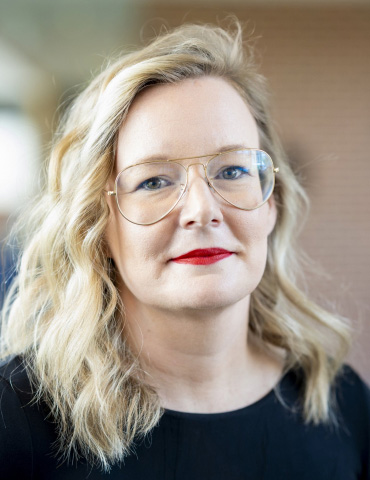
Nikki Crowley, PhD
Director, Penn State Neuroscience Institute – University Park
Huck Early Career Chair in Neurobiology and Neural Engineering
Assistant Professor of Biology, Biomedical Engineering, and PharmacologyThe strong academic and clinical partnership across the University Park, College of Medicine and commonwealth campuses, driven in part by Penn State Neuroscience Institute, allows for the highest caliber of discovery-based science to move from the bench to the bedside.
The institute allows trainees, graduate students, fellows, residents and scientists to work together in service of flourishing, healthy brain development at all stages of life. Learn more about University Park activities here.
Executive Committee

Neurology
Krish Sathian, MBBS, PhD
Chair, Neurology
Neurosurgery
Kevin Cockroft, MD
Chair, Neurosurgery
Psychiatry
Erika Saunders, MD
Chair, Psychiatry and Behavioral Health
Neural and Behavioral Sciences
Patricia Sue Grigson, MS, PhD
Chair, Neural and Behavioral Sciences
Physical Medicine and Rehabilitation
Thiru Annaswamy, MD, MA
Chair, Physical Medicine and Rehabilitation
Huck Institutes of the Life Sciences
Nikki Crowley, PhD
Assistant Professor, Biology, Biomedical Engineering, and Pharmacology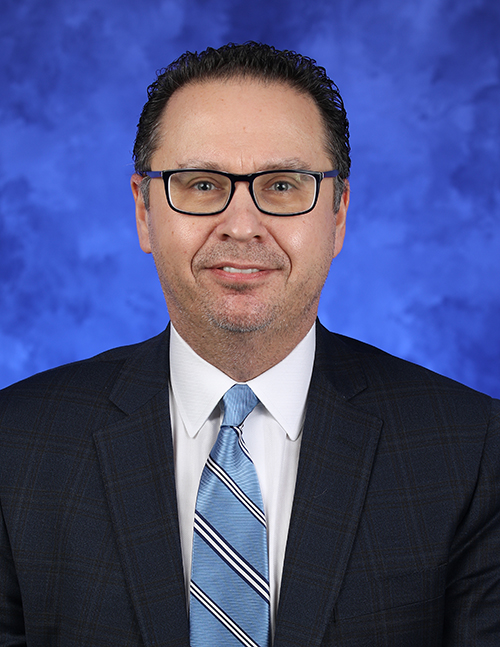
Brian Spector, MPA
Operations director
Neurology
Krish Sathian, MBBS, PhD
Chair, Neurology
Neurosurgery
Kevin Cockroft, MD
Chair, Neurosurgery
Psychiatry
Erika Saunders, MD
Chair, Psychiatry and Behavioral Health
Neural and Behavioral Sciences
Patricia Sue Grigson, MS, PhD
Chair, Neural and Behavioral Sciences
Physical Medicine and Rehabilitation
Thiru Annaswamy, MD, MA
Chair, Physical Medicine and Rehabilitation
Huck Institutes of the Life Sciences
Nikki Crowley, PhD
Assistant Professor, Biology, Biomedical Engineering, and Pharmacology
Brian Spector, MPA
Operations directorAdvisory Committee

Debra Byler, MD
Chief, Division of Pediatric Neurology
Raymond Hohl, MD, PhD
Director, Penn State Cancer Institute
Yongsoo Kim, PhD
Neuroscience Graduate Program
Sangam Kanekar, MD
Chief, Neuroradiology
Debra Byler, MD
Chief, Division of Pediatric Neurology
Raymond Hohl, MD, PhD
Director, Penn State Cancer Institute
Yongsoo Kim, PhD
Neuroscience Graduate Program
Sangam Kanekar, MD
Chief, NeuroradiologyCouncil of Center Directors

Sonia Cavigelli, PhD
Associate Professor of Biobehavioral Health
Co-Director, Center for Brain, Behavior and Cognition (CBBC)
Bruce Gluckman, PhD
Professor of Enginering Science and Mechanics
Director, Center for Neural Engineering (CNE)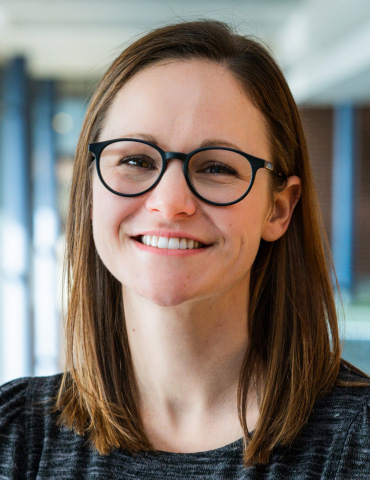
Janine Kwapis, PhD
Assistant Professor, Biology
Director, Center for Molecular Investigation of Neurological Disorders (CMIND)
Robert Sainburg, PhD, OTR/L
Professor of Kinesiology
Director, Center for Movement Science and Technology (C-MOST)
Sonia Cavigelli, PhD
Associate Professor of Biobehavioral Health
Co-Director, Center for Brain, Behavior and Cognition (CBBC)
Bruce Gluckman, PhD
Professor of Enginering Science and Mechanics
Director, Center for Neural Engineering (CNE)
Janine Kwapis, PhD
Assistant Professor, Biology
Director, Center for Molecular Investigation of Neurological Disorders (CMIND)
Robert Sainburg, PhD, OTR/L
Professor of Kinesiology
Director, Center for Movement Science and Technology (C-MOST)
- Director - Hershey
- Director - University Park
- Executive Committee
- Advisory Committee
- Council of Center Directors

Krish Sathian, MBBS, PhD
Director, Penn State Neuroscience Institute – Hershey
Chair, Neurology
Welcome to the Penn State Neuroscience Institute (PSNI) at Penn State College of Medicine and Penn State Health Milton S. Hershey Medical Center! The Hershey and University Park components at PSNI work together to facilitate the interdisciplinary integration of neuroscience research (bench and clinical), education, community outreach and health care delivery, and fosters the synergies between these missions. Our vision is for PSNI to be a nationally recognized leader in the neurosciences, characterized by outstanding collaborative research, interdisciplinary educational programs, unified impact on the community, and exemplary integrative clinical programs.
PSNI at Hershey comprises faculty and trainees across multiple clinical and basic science departments. Neuroscience graduate students in various graduate programs at the Hershey campus, particularly the Neuroscience Graduate Program, are mentored by PSNI faculty. Support for submission of grant applications by faculty and trainees is provided by a pre-award team. The Clinical Research Office (CRO) of PSNI supports clinical research, including clinical trials, and includes a biorepository, as well as regulatory and compliance functions, activation of new studies and post-award financial management.
On the clinical side, the Stroke Center of PSNI houses administrative support for the Comprehensive Stroke Center at Penn State Health Milton S. Hershey Medical Center, which is staffed by neurovascular clinicians in Neurology and Neurosurgery.

Nikki Crowley, PhD
Director, Penn State Neuroscience Institute – University Park
Huck Early Career Chair in Neurobiology and Neural Engineering
Assistant Professor of Biology, Biomedical Engineering, and Pharmacology
The strong academic and clinical partnership across the University Park, College of Medicine and commonwealth campuses, driven in part by Penn State Neuroscience Institute, allows for the highest caliber of discovery-based science to move from the bench to the bedside.
The institute allows trainees, graduate students, fellows, residents and scientists to work together in service of flourishing, healthy brain development at all stages of life. Learn more about University Park activities here.

Neurology
Krish Sathian, MBBS, PhD
Chair, Neurology

Neurosurgery
Kevin Cockroft, MD
Chair, Neurosurgery

Psychiatry
Erika Saunders, MD
Chair, Psychiatry and Behavioral Health

Neural and Behavioral Sciences
Patricia Sue Grigson, MS, PhD
Chair, Neural and Behavioral Sciences

Physical Medicine and Rehabilitation
Thiru Annaswamy, MD, MA
Chair, Physical Medicine and Rehabilitation

Huck Institutes of the Life Sciences
Nikki Crowley, PhD
Assistant Professor, Biology, Biomedical Engineering, and Pharmacology

Brian Spector, MPA
Operations director

Neurology
Krish Sathian, MBBS, PhD
Chair, Neurology

Neurosurgery
Kevin Cockroft, MD
Chair, Neurosurgery

Psychiatry
Erika Saunders, MD
Chair, Psychiatry and Behavioral Health

Neural and Behavioral Sciences
Patricia Sue Grigson, MS, PhD
Chair, Neural and Behavioral Sciences

Physical Medicine and Rehabilitation
Thiru Annaswamy, MD, MA
Chair, Physical Medicine and Rehabilitation

Huck Institutes of the Life Sciences
Nikki Crowley, PhD
Assistant Professor, Biology, Biomedical Engineering, and Pharmacology

Brian Spector, MPA
Operations director

Debra Byler, MD
Chief, Division of Pediatric Neurology

Raymond Hohl, MD, PhD
Director, Penn State Cancer Institute

Yongsoo Kim, PhD
Neuroscience Graduate Program

Sangam Kanekar, MD
Chief, Neuroradiology

Debra Byler, MD
Chief, Division of Pediatric Neurology

Raymond Hohl, MD, PhD
Director, Penn State Cancer Institute

Yongsoo Kim, PhD
Neuroscience Graduate Program

Sangam Kanekar, MD
Chief, Neuroradiology

Sonia Cavigelli, PhD
Associate Professor of Biobehavioral Health
Co-Director, Center for Brain, Behavior and Cognition (CBBC)

Bruce Gluckman, PhD
Professor of Enginering Science and Mechanics
Director, Center for Neural Engineering (CNE)

Janine Kwapis, PhD
Assistant Professor, Biology
Director, Center for Molecular Investigation of Neurological Disorders (CMIND)

Robert Sainburg, PhD, OTR/L
Professor of Kinesiology
Director, Center for Movement Science and Technology (C-MOST)

Sonia Cavigelli, PhD
Associate Professor of Biobehavioral Health
Co-Director, Center for Brain, Behavior and Cognition (CBBC)

Bruce Gluckman, PhD
Professor of Enginering Science and Mechanics
Director, Center for Neural Engineering (CNE)

Janine Kwapis, PhD
Assistant Professor, Biology
Director, Center for Molecular Investigation of Neurological Disorders (CMIND)

Robert Sainburg, PhD, OTR/L
Professor of Kinesiology
Director, Center for Movement Science and Technology (C-MOST)
Clinical Research Office
Overview
Clinical Research Office Overview
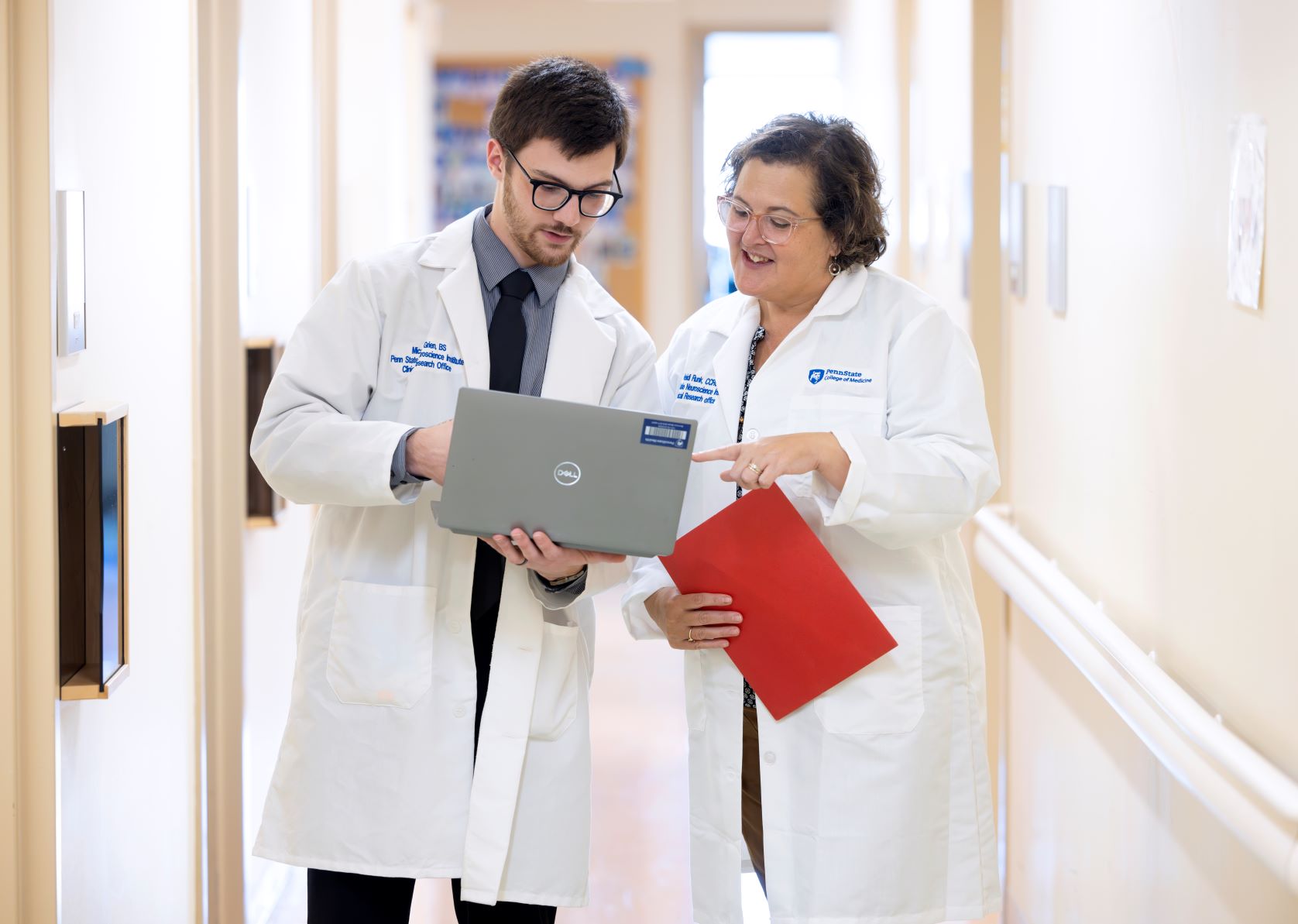
Mission: To provide investigators with the support needed to successfully conduct clinical research.The Clinical Research Office is dedicated to the coordination and management of human subjects research for the Penn State Neuroscience Institute, presently managing more than 90 investigator-initiated and industry-sponsored clinical research projects for the Departments of Neurology, Neurosurgery, and Neural and Behavioral Sciences. The office is staffed with 11 clinical research coordinators and two compliance specialists who are responsible for overseeing the day-to-day activities such as regulatory document preparation, patient recruitment, and data collection and documentation associated with the research project. Research projects are organized by disease type and assigned to specific coordinators experienced in each disease management area.
Research Administration
The Clinical Research Office’s compliance team helps investigators initiate studies within Penn State College of Medicine. The team provides support such as: shepherding contract documents through the Office of Research Affairs, budget review and document processing including data use agreements, non-disclosure or confidentiality agreements with industry sponsored clinical trials and material transfer requests.
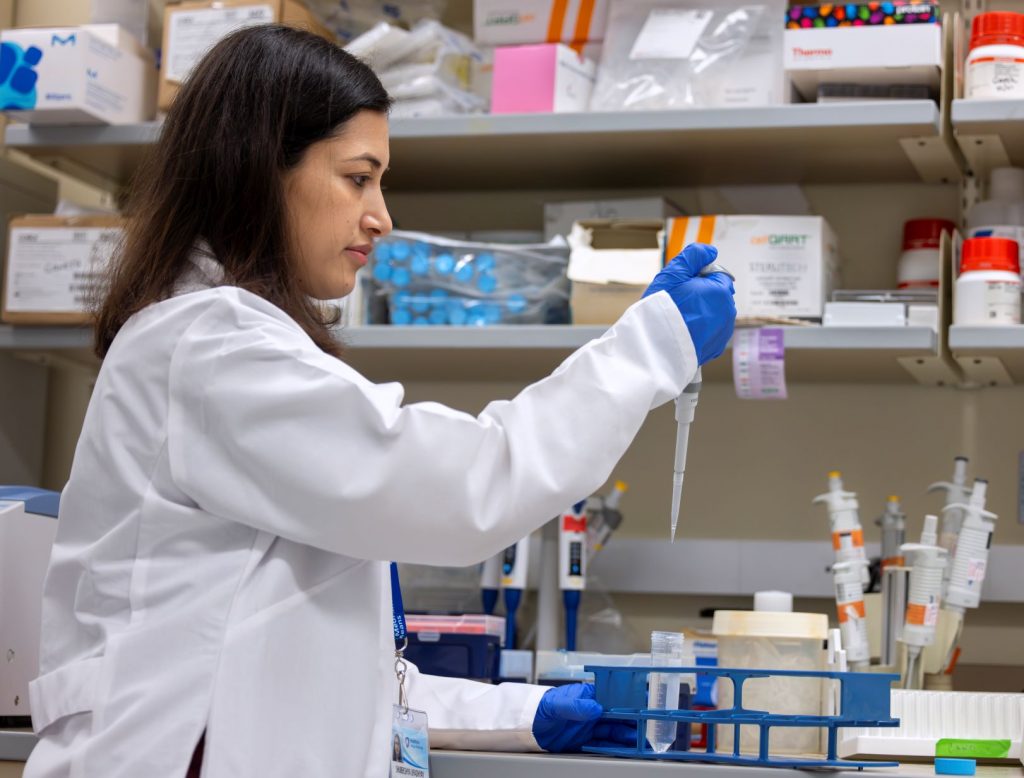 Consultations are offered for clinical trial-related research questions and guidance. For example, the team can provide guidance on information needed to submit to the Internal Review Board, as well as guidance on research administration and the process for initiating a clinical trial at the College of Medicine.
Consultations are offered for clinical trial-related research questions and guidance. For example, the team can provide guidance on information needed to submit to the Internal Review Board, as well as guidance on research administration and the process for initiating a clinical trial at the College of Medicine. Contact Rachel Myers, rmyers12@pennstatehealth.psu.edu, or Joy Verner, jverner@pennstatehealth.psu.edu, for research support assistance.
Research Coordination
The Clinical Research Office provides clinical research coordination services for clinical trials within the Penn State Neuroscience Institute.
The team of experienced staff provides support in all aspects of trial related research needs, including:
- Recruiting and consenting patients
- Scheduling and conducting study visits and related assessments
- Data collection and maintenance of study records
- Managing regulatory components of studies, including submitting to IRB for continuing reviews and study modifications, and managing monitoring visits from sponsors
- Coordination of study needs with clinical care team and principal investigator
Core Areas of Expertise
Cerebrovascular
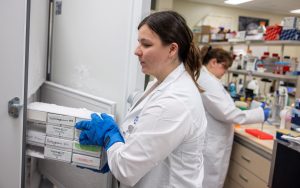
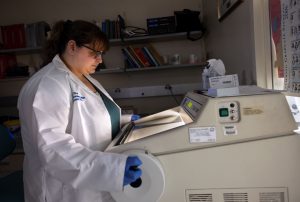
With a portfolio of studies focused on cerebrovascular disease within the Departments of Neurology and Neurosurgery, research coordinators focus on trials which impact those with stroke, acute brain bleeds and other neurological conditions like Epilepsy.
Neuro-Oncology
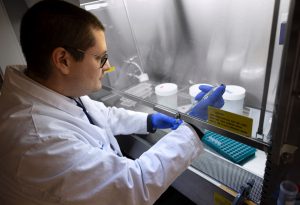
With a portfolio of work that supports newly diagnosed and recurring brain cancers for the Departments of Neurology and Neurosurgery, this team is dedicated to supporting cutting-edge clinical trial research, and has expertise in both drug and device related studies.
Neuromuscular
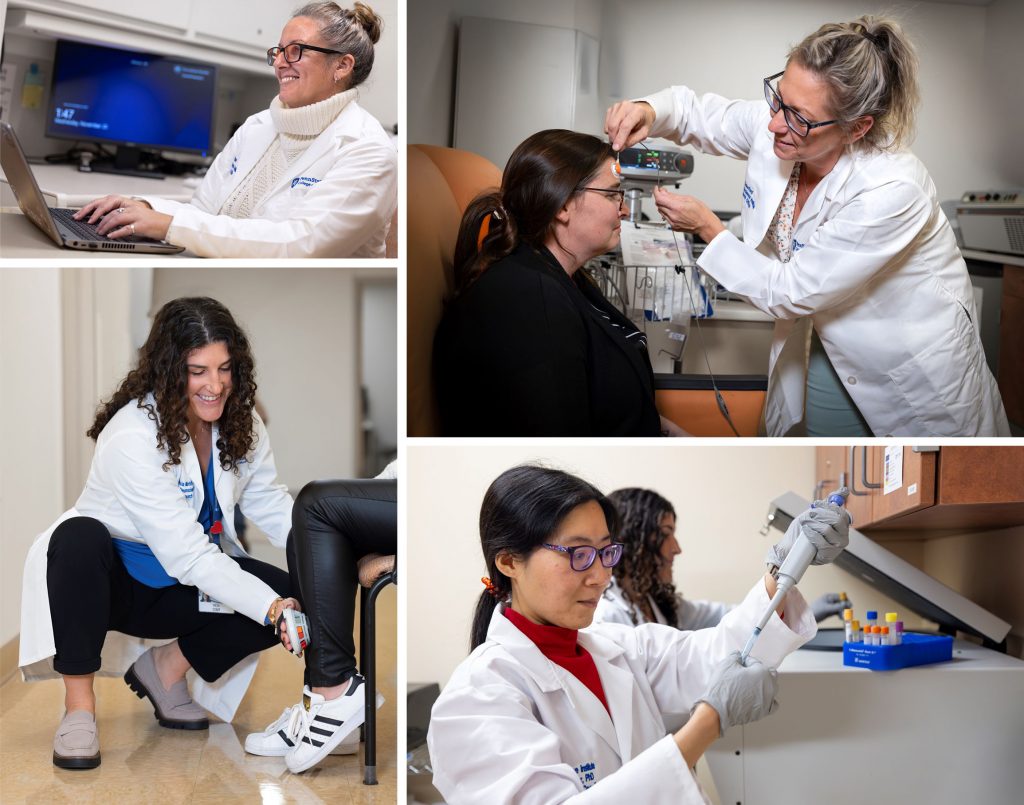
The amyotrophic lateral sclerosis (ALS) clinical trials are organized within three categories: Treatment trials of medications, the use of technology, improving the understanding of ALS.
Biorepository
Biorepository
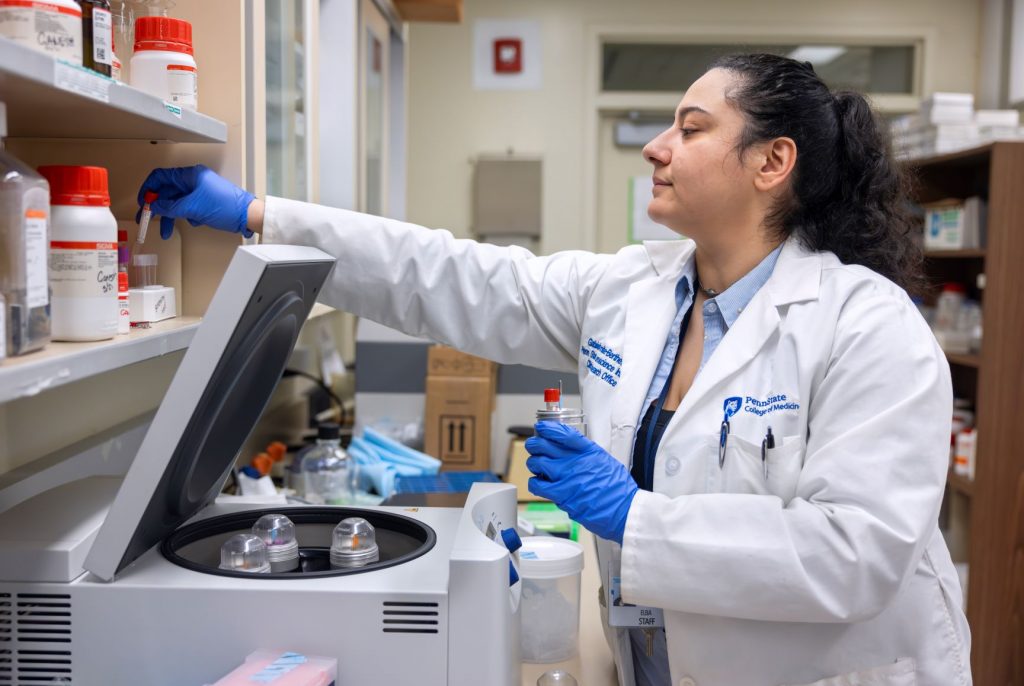 The Penn State Neurosciences Biorepository at the College of Medicine, Milton S. Hershey Medical Center is an integrated specimen (tissue, blood, spinal fluid and buccal swab) bank and clinical database. The purpose is to facilitate basic science, clinical research and translational studies by providing researchers with the ability to obtain and study human specimens using a dynamic collection, storage, annotation, and distribution service. Relevant associated demographic, clinical and outcome data are stored in a REDCapTM database. Four distinct types of biological samples are collected on diverse patient populations under neurosurgery, neuro-oncology, and neurology care: tissue (brain tumors, epilepsy brain tissue, peripheral nerve tumors, spine tumors, vascular tissue, plaque, etc.), cerebral spinal fluid (CSF), blood (whole, plasma, serum, buffy coat) and buccal swab samples.
The Penn State Neurosciences Biorepository at the College of Medicine, Milton S. Hershey Medical Center is an integrated specimen (tissue, blood, spinal fluid and buccal swab) bank and clinical database. The purpose is to facilitate basic science, clinical research and translational studies by providing researchers with the ability to obtain and study human specimens using a dynamic collection, storage, annotation, and distribution service. Relevant associated demographic, clinical and outcome data are stored in a REDCapTM database. Four distinct types of biological samples are collected on diverse patient populations under neurosurgery, neuro-oncology, and neurology care: tissue (brain tumors, epilepsy brain tissue, peripheral nerve tumors, spine tumors, vascular tissue, plaque, etc.), cerebral spinal fluid (CSF), blood (whole, plasma, serum, buffy coat) and buccal swab samples.Biorepository specimens are available for use by investigators through a specific protocol approval process. Samples and data are released in a de-identified manner. The Biorepository is staffed by a Biorepository specialist and a data manager.
If you would like to request more information or request samples for distribution, please submit this form.
Please use the following language to credit the PSNI Biorepository in publications or presentations:
“We would like to acknowledge The Penn State Neuroscience Institute Biorepository for providing the biospecimens used in this study. The biorepository, supported by the Penn State Neuroscience Institute in Hershey, facilitated the collection, storage, and distribution of human biological samples and associated data, which were critical to the success of this research.”
Data Management
Data Management
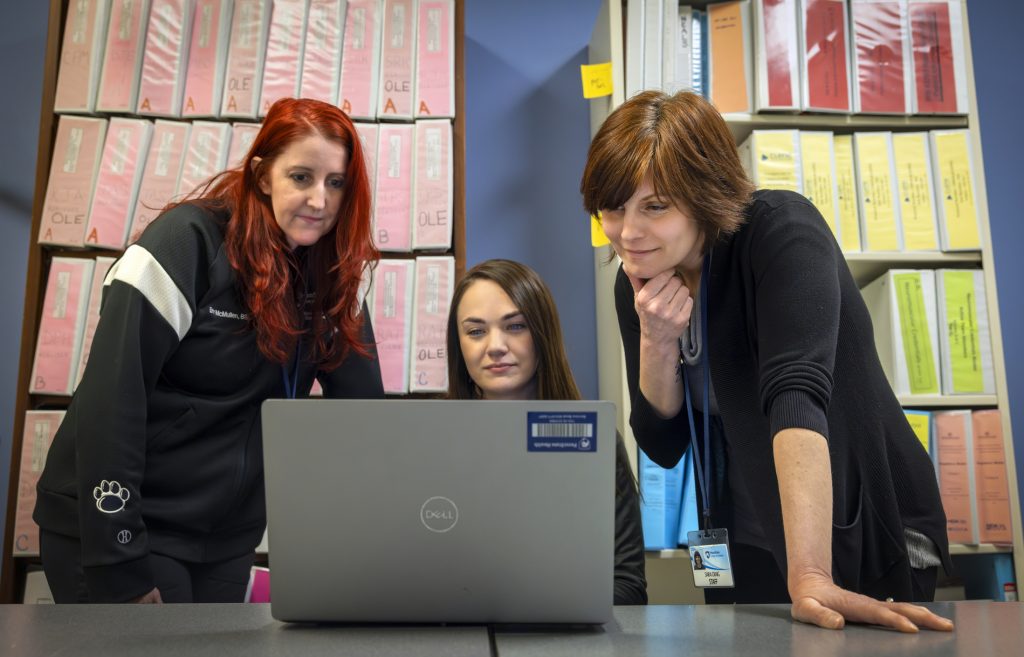
Penn State Neuroscience Institute Clinical Research Office research data manager is responsible for the development and maintenance of research databases using a common data dictionary for all projects, as well as ongoing data monitoring and quality assurance. REDCap (Research Electronic Data Capture) is a secure, web-based application designed to support data capture for human subject research studies. The REDCap application allows users to build and manage online surveys and databases quickly and securely. Examples of databases developed include projects which support studies which support patient and physician surveys, data collection for registries ( specimen and clinical data), and interventional clinical trial studies.Meet the team
Meet the Team
Physician Leadership Team

Zachary Simmons, MD
Chair, Physician Leadership Team
Professor and Vice Chair for Research, Neurology
Professor, Humanities
Ephraim Church, MD
Professor, Neurosurgery, Radiology and Neurology
Brad Zacharia, MD, MS
Associate Professor, Neurosurgery and Otolaryngology – Head and Neck Surgery
Zachary Simmons, MD
Chair, Physician Leadership Team
Professor and Vice Chair for Research, Neurology
Professor, Humanities
Ephraim Church, MD
Professor, Neurosurgery, Radiology and Neurology
Brad Zacharia, MD, MS
Associate Professor, Neurosurgery and Otolaryngology – Head and Neck Surgery
Clinical Research Office Overview

Mission: To provide investigators with the support needed to successfully conduct clinical research.
The Clinical Research Office is dedicated to the coordination and management of human subjects research for the Penn State Neuroscience Institute, presently managing more than 90 investigator-initiated and industry-sponsored clinical research projects for the Departments of Neurology, Neurosurgery, and Neural and Behavioral Sciences. The office is staffed with 11 clinical research coordinators and two compliance specialists who are responsible for overseeing the day-to-day activities such as regulatory document preparation, patient recruitment, and data collection and documentation associated with the research project. Research projects are organized by disease type and assigned to specific coordinators experienced in each disease management area.
Research Administration
The Clinical Research Office’s compliance team helps investigators initiate studies within Penn State College of Medicine. The team provides support such as: shepherding contract documents through the Office of Research Affairs, budget review and document processing including data use agreements, non-disclosure or confidentiality agreements with industry sponsored clinical trials and material transfer requests.
 Consultations are offered for clinical trial-related research questions and guidance. For example, the team can provide guidance on information needed to submit to the Internal Review Board, as well as guidance on research administration and the process for initiating a clinical trial at the College of Medicine.
Consultations are offered for clinical trial-related research questions and guidance. For example, the team can provide guidance on information needed to submit to the Internal Review Board, as well as guidance on research administration and the process for initiating a clinical trial at the College of Medicine.
Contact Rachel Myers, rmyers12@pennstatehealth.psu.edu, or Joy Verner, jverner@pennstatehealth.psu.edu, for research support assistance.
Research Coordination
The Clinical Research Office provides clinical research coordination services for clinical trials within the Penn State Neuroscience Institute.
The team of experienced staff provides support in all aspects of trial related research needs, including:
- Recruiting and consenting patients
- Scheduling and conducting study visits and related assessments
- Data collection and maintenance of study records
- Managing regulatory components of studies, including submitting to IRB for continuing reviews and study modifications, and managing monitoring visits from sponsors
- Coordination of study needs with clinical care team and principal investigator
Cerebrovascular


With a portfolio of studies focused on cerebrovascular disease within the Departments of Neurology and Neurosurgery, research coordinators focus on trials which impact those with stroke, acute brain bleeds and other neurological conditions like Epilepsy.
Neuro-Oncology

With a portfolio of work that supports newly diagnosed and recurring brain cancers for the Departments of Neurology and Neurosurgery, this team is dedicated to supporting cutting-edge clinical trial research, and has expertise in both drug and device related studies.
Neuromuscular

The amyotrophic lateral sclerosis (ALS) clinical trials are organized within three categories: Treatment trials of medications, the use of technology, improving the understanding of ALS.
Biorepository
 The Penn State Neurosciences Biorepository at the College of Medicine, Milton S. Hershey Medical Center is an integrated specimen (tissue, blood, spinal fluid and buccal swab) bank and clinical database. The purpose is to facilitate basic science, clinical research and translational studies by providing researchers with the ability to obtain and study human specimens using a dynamic collection, storage, annotation, and distribution service. Relevant associated demographic, clinical and outcome data are stored in a REDCapTM database. Four distinct types of biological samples are collected on diverse patient populations under neurosurgery, neuro-oncology, and neurology care: tissue (brain tumors, epilepsy brain tissue, peripheral nerve tumors, spine tumors, vascular tissue, plaque, etc.), cerebral spinal fluid (CSF), blood (whole, plasma, serum, buffy coat) and buccal swab samples.
The Penn State Neurosciences Biorepository at the College of Medicine, Milton S. Hershey Medical Center is an integrated specimen (tissue, blood, spinal fluid and buccal swab) bank and clinical database. The purpose is to facilitate basic science, clinical research and translational studies by providing researchers with the ability to obtain and study human specimens using a dynamic collection, storage, annotation, and distribution service. Relevant associated demographic, clinical and outcome data are stored in a REDCapTM database. Four distinct types of biological samples are collected on diverse patient populations under neurosurgery, neuro-oncology, and neurology care: tissue (brain tumors, epilepsy brain tissue, peripheral nerve tumors, spine tumors, vascular tissue, plaque, etc.), cerebral spinal fluid (CSF), blood (whole, plasma, serum, buffy coat) and buccal swab samples.
Biorepository specimens are available for use by investigators through a specific protocol approval process. Samples and data are released in a de-identified manner. The Biorepository is staffed by a Biorepository specialist and a data manager.
If you would like to request more information or request samples for distribution, please submit this form.
Please use the following language to credit the PSNI Biorepository in publications or presentations:
“We would like to acknowledge The Penn State Neuroscience Institute Biorepository for providing the biospecimens used in this study. The biorepository, supported by the Penn State Neuroscience Institute in Hershey, facilitated the collection, storage, and distribution of human biological samples and associated data, which were critical to the success of this research.”
Data Management

Penn State Neuroscience Institute Clinical Research Office research data manager is responsible for the development and maintenance of research databases using a common data dictionary for all projects, as well as ongoing data monitoring and quality assurance. REDCap (Research Electronic Data Capture) is a secure, web-based application designed to support data capture for human subject research studies. The REDCap application allows users to build and manage online surveys and databases quickly and securely. Examples of databases developed include projects which support studies which support patient and physician surveys, data collection for registries ( specimen and clinical data), and interventional clinical trial studies.
Meet the Team

Zachary Simmons, MD
Chair, Physician Leadership Team
Professor and Vice Chair for Research, Neurology
Professor, Humanities

Ephraim Church, MD
Professor, Neurosurgery, Radiology and Neurology

Brad Zacharia, MD, MS
Associate Professor, Neurosurgery and Otolaryngology – Head and Neck Surgery

Zachary Simmons, MD
Chair, Physician Leadership Team
Professor and Vice Chair for Research, Neurology
Professor, Humanities

Ephraim Church, MD
Professor, Neurosurgery, Radiology and Neurology

Brad Zacharia, MD, MS
Associate Professor, Neurosurgery and Otolaryngology – Head and Neck Surgery
Pre-award
Overview
Pre-award Overview
The Neuroscience Institute pre-award team currently consists of a grants and contracts manager and two pre-award specialists. This team provides pre-award support for the departments of Neurology, Neurosurgery and Physical Medicine and Rehabilitation. Specifically, the team works closely with faculty members on their grant applications, annual progress reports, Just in Time requests and other grants-related matters. The pre-award team is designed to provide cross-coverage service to investigators, ensuring seamless work when one or more team members are out of the office to ensure work flow is never interrupted for our investigators. Since 2017, the Neuroscience pre-award team has submitted 540 external grant applications (nearly $122 million) and activated 294 funded awards (more than $51 million). The team is dedicated to providing superb service to investigators so they can focus on their research.
Meet the Team
Meet the Team
Pre-award Overview
The Neuroscience Institute pre-award team currently consists of a grants and contracts manager and two pre-award specialists. This team provides pre-award support for the departments of Neurology, Neurosurgery and Physical Medicine and Rehabilitation. Specifically, the team works closely with faculty members on their grant applications, annual progress reports, Just in Time requests and other grants-related matters. The pre-award team is designed to provide cross-coverage service to investigators, ensuring seamless work when one or more team members are out of the office to ensure work flow is never interrupted for our investigators. Since 2017, the Neuroscience pre-award team has submitted 540 external grant applications (nearly $122 million) and activated 294 funded awards (more than $51 million). The team is dedicated to providing superb service to investigators so they can focus on their research.
Meet the Team
Participate in Research
Researchers, physicians and trainees in the Neuroscience Institute are regularly engaged in research to better understand and treat neurological and neural behavioral diseases. Clinical research opportunities are available in the following areas:
Education
Penn State has two separate neuroscience graduate programs: One at the College of Medicine in Hershey, Pa., and another at the University Park campus in State College, Pa. The two campuses are approximately 100 miles apart. Penn State Neuroscience Institute is a cross-campus entity, serving to facilitate interactions between neuroscientists and clinicians on both campuses.
College of Medicine Neuroscience Graduate Program
College of Medicine Neuroscience Graduate Program
The Neuroscience (NEURO) Graduate Program provides students curricular training with a broad focus on neuroscience, and the opportunity for concentrated research in a variety of disciplinary approaches to neuroscience such as biochemistry, cell biology, embryology, genetics, immunology, neuroscience, pharmacology, physiology, structural biology, and virology. Students receive rigorous training that provides the skills necessary to be leaders in biomedical research and other endeavors that benefit from a rigorous scientific background, including education, law, journalism, and public policy.
The Neuroscience Graduate Program is an interdepartmental program that engages faculty from multiple basic science and clinical science departments. This broad-reaching Program provides students a wide ranging understanding of multiple disciplines with specific expertise in a chosen area, and encourages interdisciplinary research that is the hallmark of biomedical sciences in the 21st century.
University Park Neuroscience Graduate Program
University Park Neuroscience Graduate Program
The Neuroscience (NERV) Graduate Program at University Park is an Intercollege Graduate Degree Program affiliated with the Huck Institutes of the Life Sciences, the Eberly College of Science, and the College of Engineering. The program provides pedagogical and research training in the field of neuroscience which is inherently interdisciplinary and spans from molecules to organisms and utilizes both animal and human models. Students receive training in research and communications skills to enable them to succeed in careers in biomedical research and other professional fields related to the discipline. The Neuroscience Graduate Program engages faculty from the Colleges of Agricultural Sciences, Engineering, Health and Human Development, Information Sciences and Technology, and Liberal Arts, and Eberly College of Science. Students gain a broad understanding of Neuroscience as well as specific expertise in their focused area of research.
College of Medicine Neuroscience Graduate Program
The Neuroscience (NEURO) Graduate Program provides students curricular training with a broad focus on neuroscience, and the opportunity for concentrated research in a variety of disciplinary approaches to neuroscience such as biochemistry, cell biology, embryology, genetics, immunology, neuroscience, pharmacology, physiology, structural biology, and virology. Students receive rigorous training that provides the skills necessary to be leaders in biomedical research and other endeavors that benefit from a rigorous scientific background, including education, law, journalism, and public policy.
The Neuroscience Graduate Program is an interdepartmental program that engages faculty from multiple basic science and clinical science departments. This broad-reaching Program provides students a wide ranging understanding of multiple disciplines with specific expertise in a chosen area, and encourages interdisciplinary research that is the hallmark of biomedical sciences in the 21st century.
University Park Neuroscience Graduate Program
The Neuroscience (NERV) Graduate Program at University Park is an Intercollege Graduate Degree Program affiliated with the Huck Institutes of the Life Sciences, the Eberly College of Science, and the College of Engineering. The program provides pedagogical and research training in the field of neuroscience which is inherently interdisciplinary and spans from molecules to organisms and utilizes both animal and human models. Students receive training in research and communications skills to enable them to succeed in careers in biomedical research and other professional fields related to the discipline. The Neuroscience Graduate Program engages faculty from the Colleges of Agricultural Sciences, Engineering, Health and Human Development, Information Sciences and Technology, and Liberal Arts, and Eberly College of Science. Students gain a broad understanding of Neuroscience as well as specific expertise in their focused area of research.
Calendar of Events
- Neuroscience Institute events will appear below.
- Check back for details on the monthly Big10 Neuroscience Seminar series.
- For more events related to neurosciences at Huck Institutes of the Life Sciences, visit huck.psu.edu/events.
